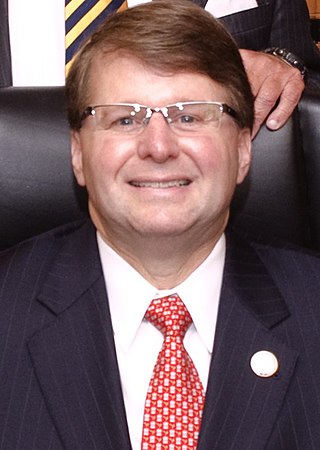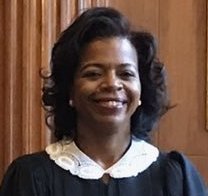The North Carolina judicial elections of 2000 were held on 7 November 2000, to elect judges to the North Carolina Supreme Court and North Carolina Court of Appeals.
| Elections in North Carolina |
|---|
 |
The North Carolina judicial elections of 2000 were held on 7 November 2000, to elect judges to the North Carolina Supreme Court and North Carolina Court of Appeals.
| Party | Candidate | Votes | % | ±% | |
|---|---|---|---|---|---|
| Republican | I. Beverly Lake | 1,453,039 | 51.36 | ||
| Democratic | Henry Frye (incumbent) | 1,375,820 | 48.64 | ||
| Turnout | 2,828,859 | ||||
| Party | Candidate | Votes | % | ±% | |
|---|---|---|---|---|---|
| Republican | Robert H. Edmunds Jr. | 1,436,510 | 51.95 | ||
| Democratic | Franklin Freeman (incumbent) | 1,328,623 | 48.05 | ||
| Turnout | 2,765,133 | ||||
| Party | Candidate | Votes | % | ±% | |
|---|---|---|---|---|---|
| Republican | Douglas McCullough | 1,371,798 | 50.32 | ||
| Democratic | Clarence E. Horton Jr. (incumbent) | 1,354,543 | 49.68 | ||
| Turnout | 2,726,341 | ||||
| Party | Candidate | Votes | % | ±% | |
|---|---|---|---|---|---|
| Republican | John M. Tyson | 1,364,239 | 50.07 | ||
| Democratic | Jim Fuller | 1,360,309 | 49.93 | ||
| Turnout | 2,724,548 | ||||
| Party | Candidate | Votes | % | ±% | |
|---|---|---|---|---|---|
| Democratic | Robin E. Hudson | 1,396,957 | 51.46 | ||
| Republican | Paul Stam | 1,317,677 | 48.54 | ||
| Turnout | 2,714,634 | ||||
| Party | Candidate | Votes | % | ±% | |
|---|---|---|---|---|---|
| Democratic | John C. Martin (incumbent) | 1,375,920 | 50.63 | ||
| Republican | Wendy M. Enochs | 1,341,854 | 49.37 | ||
| Turnout | 2,717,774 | ||||
| Party | Candidate | Votes | % | ±% | |
|---|---|---|---|---|---|
| Democratic | James A. Wynn Jr. (incumbent) | 1,390,169 | 51.49 | ||
| Republican | Wendell Schollander | 1,309,655 | 48.51 | ||
| Turnout | 2,699,824 | ||||

Mark D. Martin is an American jurist who served as the chief justice of the Supreme Court of North Carolina from 2014 through 2019. He was appointed by North Carolina Governor Pat McCrory to become Chief Justice on September 1, 2014 upon the retirement of Sarah Parker. Martin was already running for the seat in the 2014 general election.
Robert Holt Edmunds Jr. is an American lawyer, formerly an associate justice of the North Carolina Supreme Court.

The Supreme Court of the State of North Carolina is the state of North Carolina's highest appellate court. Until the creation of the North Carolina Court of Appeals in the 1960s, it was the state's only appellate court. The Supreme Court consists of six associate justices and one chief justice, although the number of justices has varied. The primary function of the Supreme Court is to decide questions of law that have arisen in the lower courts and before state administrative agencies.
J. Douglas McCullough is an American lawyer and former judge of the North Carolina Court of Appeals. McCullough retired in 2017.

North Carolina is currently divided into 14 congressional districts, each represented by a member of the United States House of Representatives. After the 2000 census, the number of North Carolina's seats was increased from 12 to 13 due to the state's increase in population. In the 2022 elections, per the 2020 United States census, North Carolina gained one new congressional seat for a total of 14.

Several judges of the North Carolina Supreme Court and the North Carolina Court of Appeals, the state's two appellate courts, were elected on November 2, 2004. The 2004 United States presidential election, 2004 United States House election, 2004 United States Senate election, 2004 North Carolina Council of State election and 2004 North Carolina General Assembly election were held on the same day.

Justices of the North Carolina Supreme Court and judges of the North Carolina Court of Appeals are elected to eight-year terms in statewide judicial elections. In 2006, all these races were non-partisan. The 2006 congressional elections and the 2006 North Carolina legislative elections were held on the same day, November 7, 2006.

North Carolina's 12th congressional district is a congressional district located in the northern and eastern portions of Charlotte as well as surrounding areas in Mecklenburg County and Cabarrus County represented by Democrat Alma Adams. Prior to the 2016 elections, it was a gerrymandered district located in central North Carolina that comprised portions of Charlotte, Winston-Salem, Greensboro, Lexington, Salisbury, Concord, and High Point.

One justice of the North Carolina Supreme Court and six judges of the North Carolina Court of Appeals were elected to eight-year terms by North Carolina voters on November 4, 2008. This coincided with the presidential, U.S. Senate, U.S. House, gubernatorial, and Council of State elections.

Cheri Lynn Beasley is an American attorney and jurist who served as the chief justice of the North Carolina Supreme Court from 2019 to 2020; she was appointed an associate justice in 2012. Beasley had previously served on the North Carolina Court of Appeals and as a district court judge in Cumberland County, North Carolina.

One justice of the North Carolina Supreme Court and five judges of the North Carolina Court of Appeals were elected by North Carolina voters on November 2, 2010, on the same day as the U.S. Senate election, U.S. House elections, and other state-level elections. North Carolina judicial elections are non-partisan. Terms for seats on each court are eight years. All incumbent judges and justices who sought re-election won their respective races, except for Judge Cressie Thigpen of the Court of Appeals, who had been appointed shortly before the election and lost North Carolina's first statewide election to use Instant-runoff voting.
Cressie H. Thigpen, Jr. is a North Carolina lawyer and jurist who served on the North Carolina Court of Appeals.

One justice of the North Carolina Supreme Court and three judges of the North Carolina Court of Appeals were elected by North Carolina voters on November 6, 2012, concurrently with the elections for Governor and other offices. North Carolina judicial elections are non-partisan. Terms for seats on each court are eight years. In three of the four races, incumbents were re-elected to their seats, but incumbent Court of Appeals Judge Cressie Thigpen was defeated by Chris Dillon.

Four justices of the seven-member North Carolina Supreme Court and four judges of the 15-member North Carolina Court of Appeals were elected by North Carolina voters on November 4, 2014, concurrently with other state elections. Terms for seats on each court are eight years.

Lucy Noble Inman is a judge of the North Carolina Court of Appeals and formerly served as a special North Carolina Superior Court judge. She won election to the appellate court in a statewide race on November 4, 2014.

One justice of the seven-member North Carolina Supreme Court and five judges of the 15-member North Carolina Court of Appeals were elected by North Carolina voters on November 8, 2016, concurrently with other state elections. Terms for seats on each court are eight years.

One justice of the seven-member North Carolina Supreme Court and three judges of the 15-member North Carolina Court of Appeals were elected by North Carolina voters on November 6, 2018, concurrently with other state elections. Terms for seats on each court are eight years. These elections were partisan for the first time since the elections of 2002. A law passed by the North Carolina General Assembly in 2017 cancelled primary elections for judicial elections in 2018 only, meaning that an unlimited number of candidates from any party could run in the general election.

Three justices of the seven-member North Carolina Supreme Court and five judges of the 15-member North Carolina Court of Appeals were elected by North Carolina voters on November 3, 2020, concurrently with other state elections. Terms for seats on each court are eight years. These elections were conducted on a partisan basis.

Two justices of the seven-member North Carolina Supreme Court and four judges of the fifteen-member North Carolina Court of Appeals were elected by North Carolina voters on November 8, 2022, concurrently with other state elections. Terms for seats on each court are eight years. These elections were conducted on a partisan basis.
Moore v. Harper is an ongoing United States Supreme Court case related to independent state legislature theory (ISL), arising from the redistricting of North Carolina's districts by its legislature after the 2020 census, which the state courts found to be too artificial and partisan, and an extreme case of gerrymandering in favor of the Republican Party.